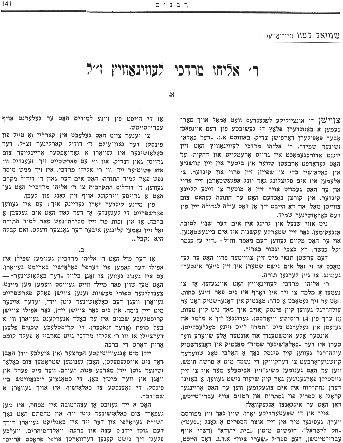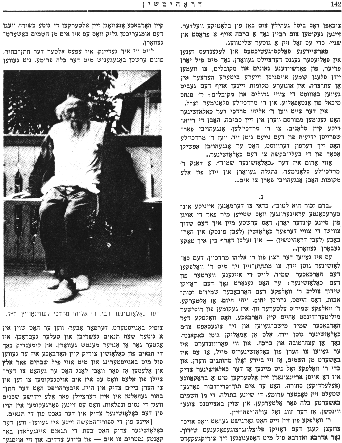Previous Page
|
Next Page

[Page 141]
Shmuel Lev (New York)
RABBI ELIYAHU MORDECHAI LEVINOVITZ
1.
Among countless legends there will be a special place in history for the simple, though popular, village holy man known as the Kholozhin Blacksmith. Rabbi Eliyahu Mordechai Levinovitz spent his youth in dire poverty and deprivation. He had to work hard and bitterly in his blacksmith shop in Kholozhin so he could support his wife and children. His wife died suddenly in her youth, and he was forced to serve as mother and father to his small children. Shortly thereafter he remarried. He then started to become a very great person.
The transformation took place slowly and with difficulty. However, his unrelenting dedication served him well, and he was able to personify the maxim of the Talmudic rabbis: “Be as strong as a tiger, as light as an eagle, run like a deer and be as courageous as a lion.”
The rebbe asked that his new wife agree to allow him to pursue his new undertaking of Torah study. R. Eliyahu Mordechai Levinovitz realized that he wasn't able to bring a teacher to his village to study with him, so he worked out the following arrangement: on Mondays and Thursdays he traveled to Pinsk (if I'm not mistaken, a distance of 14 Russian versts [approximately 10 miles]), hired a teacher, and studied intensely as much as he could.
Under all circumstances and in all kinds of weather, the “Kholozhiner Blacksmith” traveled to Pinsk on Mondays and Thursdays after a half-day's work in the blacksmith shop in order to revive his soul with Torah study. When he accomplished more, he couldn't find a study session that was able to provide him with intellectual satisfaction. He derived special and great pleasure from reading books in Yiddish on kabbalah.
In later years, after he became known to people, he owned a set of the Torah anthology, Chok Le-Yisrael, the Beit Yehuda Torah commentary (the Rashi Torah commentary in Yiddish translation), and the book, Sha'arei Zion. Evidently his primary studies were in Yiddish, rather than Hebrew.
At that time the esteemed scholar, Rabbi Dovidel Karliner lived in the town of Karlin (a part of Pinsk). Rabbi Levinovitz frequently visited that great holy man. Rabbi Dovidel of Karlin noticed how a simple Jew like Rabbi Levinovitz showed such self-sacrifice to study Torah, and drew him close to him. This had an enormous impact on Rabbi Levinovitz's entire way of life. I remember from my youth a legend that Rabbi Dovidel blessed him that because of his self-sacrifice, R. Eliyahu Mordechai would become known throughout the world. And so it was...
2.
The increasing fame of Rabbi Eliyahu Mordechai grew to such an extent that even the name of his village became famous. For miles around just the words “the Kholozhiner” was instantly recognizable. Dozens of stories about him spread among the people, and each story had its own version. This didn't happen only among Jews, but even among Christian neighbors, who knew him as a miracle-maker. The Christians used to tell how their fields would be blessed any time R. Eliyahu Mordechai even approached them.
Jews with suffering hearts (there were no shortage of them) would flock to the Kholozhiner Rebbe by horse, wagon and train. The Yochnovich train station near Pinsk, which was the closest one to Kholozhin, was also a well-known name. If a Jew needed advice in business, he traveled to the Rebbe, and in all likelihood G-d himself helped that Jew to benefit from the Rebbe's blessing or advice. Timber merchants, who couldn't wait for

[Page 142]
a snowfall to ship off some lumber on the forest railway came to the Rebbe for a blessing for snow to assure a good shipment.
People always told all kinds of stories and legends in Polesia about various eminent rabbis and kabbalists to whom Jews would go to pour out their hearts in times of trouble. In our area, Rabbi Pinchas Michael from Antopolia and Rabbi Mordechale of Slonim were famous as great scholars and kabbalists. When R. Eliyahu Mordechai became widely known in his area, his fame spread to R. Mordechale in Slonim, who started sending some people who were coming to him to go to R. Eliyahu Mordechai instead. Thanks to R. Mordchale, the fame of the Kholozhiner Blacksmith grew, and Jews from everywhere flocked to him.
3.
It's worth mentioning a few interesting stories that I remember from my childhood. The first was the marriage connection between the villages of Kholozhin (near Pinsk) and Horbacha (near Drohitchin) – the village where I was born.
Rabbi Levinovitz wanted to marry off his daughter to the son of R. Wolfka, the blacksmith of Horbacha. He wanted to do this because of R. Wolfka's illustrious ancestry. Alterka, the eldest son of R. Wolfka, returned home to Horbacha from Russian military service, and his father decided to travel to Rabbi Levinovitz, his old acquaintance, to request advice and a blessing. He was amazed to hear Rabbi Levinovitz say that it was the will of Heaven that they become in-laws. Rabbi Levinovitz didn't want R. Wolfka to think he was fooling Alterka into taking “cheap merchandise,” so he introduced his beautiful daughter Fruma as the future wife of Alterka desired by Heaven, and extended his wishes for the match to be a success.
[Photo:] The Kholozhiner Rebbe, R. Eliyahu Mordechai Levinovitz
R. Wolfka had no reason to oppose this sudden marriage proposal. On the contrary, he expressed his fondest hopes for it, and returned to Horbacha to tell Alterka the good news about the divinely ordained marriage proposal.
As far as I remember, Alterka wasn't all that enthusiastic at the first meeting with Fruma. However, when he eventually became engaged to her, he became an entirely different person. After returning to Horbacha from Kholozhin, he became extremely enthusiastic, lavishing praise upon everything and everyone, and spent four weeks talking about what he saw and heard in the holy man's house. He recounted to his Jewish neighbors all the miracles that occurred at the home of the Rebbe on the evening of the engagement. One of his stories was as follows: When the Rebbe called on the deceased relatives of both sides by name to come to him and bless the new couple, a miracle occurred.
Previous Page
|
Next Page
This material is made available by JewishGen, Inc.
and the Yizkor Book Project for the purpose of
fulfilling our
mission of disseminating information about the Holocaust and
destroyed Jewish communities.
This material may not be copied,
sold or bartered without JewishGen, Inc.'s permission. Rights may be
reserved by the copyright holder.
JewishGen, Inc. makes no representations regarding the accuracy of
the translation. The reader may wish to refer to the original material
for verification.
JewishGen is not responsible for inaccuracies or omissions in the original work and cannot rewrite or edit the text to correct inaccuracies and/or omissions.
Our mission is to produce a translation of the original work and we cannot verify the accuracy of statements or alter facts cited.
 Drogichin, Belarus
Drogichin, Belarus
 Yizkor Book Project
Yizkor Book Project
 JewishGen Home Page
JewishGen Home Page
Yizkor Book Director, Lance Ackerfeld
This web page created by Lance Ackerfeld
Copyright © 1999-2024 by JewishGen, Inc.
Updated 13 Dec 2001 by LA

 Drogichin, Belarus
Drogichin, Belarus
 Yizkor Book Project
Yizkor Book Project
 JewishGen Home Page
JewishGen Home Page